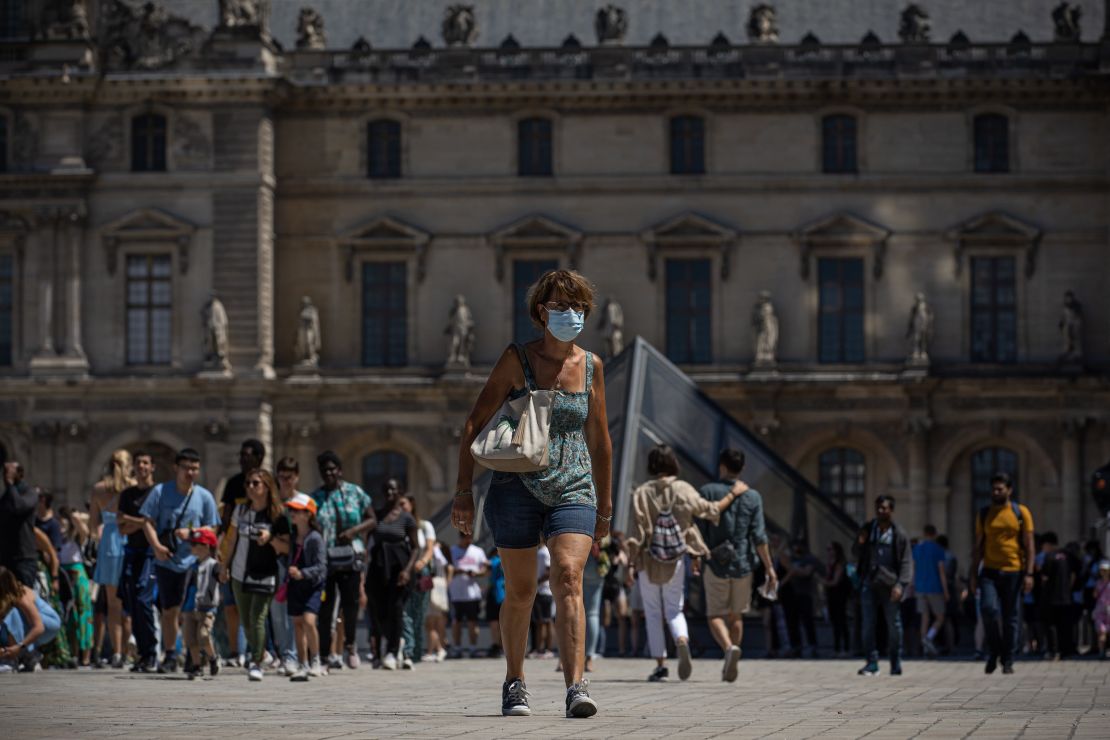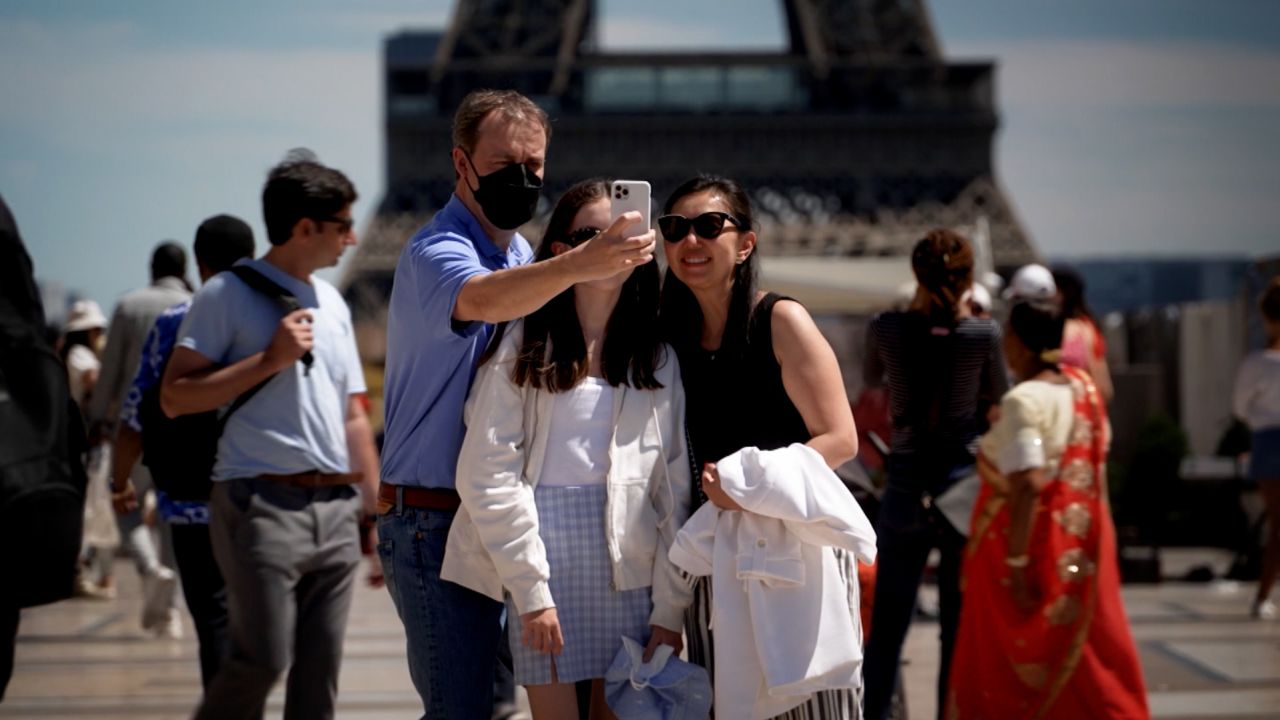This is the weekly edition of CNN’s coronavirus newsletter. Look out for your roundup every Wednesday. If you haven’t subscribed yet, sign up here.
The caption of a recent New Yorker cartoon by Bruce Eric Kaplan captures the chaos of this summer travel season amid a worsening wave of Covid-19, fueled by the highly transmissible BA.5 variant.
It also reflects the mood of many who, after two turbulent years of pandemic restrictions, self-imposed staycations and repeated surge warnings, are resigned to what now feels inevitable and determined to soldier on with their plans – come what may.
But public health officials warn that this is no time for complacency.
In the United States, BA.5 has become the dominant strain and is driving a significant spike in cases – more than 120,000 a day, according to the Centers for Disease Control and Prevention (CDC), though experts say that number may be more like 1 million, given the underreporting of home test results. Europe, meanwhile, has seen a tripling of new Covid-19 infections over the past six weeks, with nearly 3 million reported last week, accounting for almost half of all new cases worldwide. Hospital admissions in Europe over the same period have doubled.
The end of the last remaining restrictions on international travel and return of large gatherings, like music festivals, are among the factors helping the virus to spread, experts say. And the number of cases may actually be higher than data shows because countries have significantly pared back testing and surveillance, making it difficult to judge the true extent of the current surge.
It is déjà vu back to this time last year, when the Delta variant drove a wave as mask mandates were lifted and indoor mixing increased.
“This is a full-on BA.5 wave, unfortunately, that we’re experiencing in the summer,” Dr. Peter Hotez, co-director of the Center for Vaccine Development at Texas Children’s Hospital, told CNN’s Jake Tapper last week. “Guess what? Just like 2020, just like 2021.”
But there is one key difference: The Omicron subvariants fueling the surge are more transmissible. While the latest Omicron offshoot does not appear to cause more severe illness, it can evade immunity from previous infections and vaccines – increasing the risk of reinfection.
On Tuesday, the World Health Organization (WHO) warned that the spike in infections was a harbinger of an even worse situation to come, calling on countries to urgently reintroduce mitigation strategies before it was too late.
“It’s now abundantly clear we’re in a similar situation to last summer – only this time the ongoing Covid-19 wave is being propelled by sub-lineages of the Omicron variant, notably BA.2 and BA.5, with each dominant sub-lineage of Omicron showing clear transmission advantages over the previously circulating viruses,” WHO’s regional director for Europe, Hans Kluge, said in a statement.
Though intensive care admissions remain relatively low, as infection rates rise among older populations, deaths are mounting — almost 3,000 people a week are dying from Covid in Europe.
“These numbers paint a picture of the recent past,” Kluge said. “Preparing for the future is much more difficult, yet must be urgently tackled.”

US President Joe Biden said he believes the Covid-19 pandemic is “over,” even as the country continues to see around 400 deaths a day. In a Sunday interview on CBS’ “60 minutes,” the President acknowledged the US still has a “problem” with the virus – which has killed more than 1 million Americans – but said that, to his mind, “the pandemic is over.”
Travelers’ risk calculations are becoming increasingly reliant on personal preference. We’ve moved into “a phase in the pandemic where people need to make their own decisions based on their medical circumstances as well as their risk tolerance when it comes to contracting Covid-19,” said CNN Medical Analyst Dr. Leana Wen, who is an emergency physician and professor of health policy and management at George Washington University’s Milken Institute School of Public Health.
But there are ways to keep those around you safe when you return from your vacation. Wen suggests two tactics. First, try to reduce your risk by limiting time indoors, masking during indoor interactions, and avoiding indoor events with food and drink – or at least keeping a mask on during these functions and eating and drinking separately elsewhere.
The second option is to assume that you will be exposed and could contract Covid-19, then quarantine yourself and test before interacting with family members. “Not everyone is able to do this – perhaps they have young children or other family responsibilities – but that is another option that may be right for some people,” she added
YOU ASKED. WE ANSWERED.
Q: Is there a link between Covid and mental health?
A: You may have up to a 50% higher risk of developing long Covid if you suffer from common psychiatric issues, a recent study found.
The Novavax vaccine is protein-based, like many other vaccines used globally, and is therefore a more traditional design than the other Covid shots. Dr. Peter Marks, director of the Center for Biologics Evaluation and Research at the US Food and Drug Administration, said this may make those who have yet to be vaccinated “more comfortable” with receiving it.
A protein-based vaccine works by getting the body’s immune system to recognize little modified pieces of the virus it’s targeting – in this case, the coronavirus spike protein – whereas the vaccines from Moderna and Pfizer/BioNTech use mRNA, which tells cells to make the spike protein to evoke an immune response.
Novavax scientists identified the gene for the spike protein and created a modified version of that gene, which they cloned into a baculovirus that infects insects. They then infected moth cells – specifically, cells from the fall armyworm – prompting them to produce the coronavirus spike protein. These virus-like nanoparticles were harvested to make the vaccine.
“If you have been waiting for a COVID-19 vaccine built on a different technology than those previously available, now is the time to join the millions of Americans who have been vaccinated,” said Dr. Rochelle Walensky, director of the US Centers for Disease Control and Prevention, adding that vaccination is critical, especially “with Covid-19 cases on the rise again.”
Send your questions here. Are you a health care worker fighting Covid-19? Message us on WhatsApp about the challenges you’re facing: +1 347-322-0415.
READS OF THE WEEK
More than 2,000 tourists have become stranded in a resort town in southern China after authorities imposed a snap lockdown to curb a coronavirus flare-up.
The city of Beihai, a popular summer holiday destination in the Guangxi region, known for its white-sand beach and volcanic island, has reported more than 500 infections over the past week – a major outbreak by China’s standards.
On Saturday, the Beihai government locked down urban parts of the city – where its resorts and tourist attractions are located – ordered mass testing and banned residents from leaving their homes.
At a news conference, local officials said the 2,000+ tourists would be treated based on their levels of Covid risk. Those who had not been to medium- or high-risk areas, and who were not identified as a direct or secondary contact of an infected person, would be allowed to leave, provided they could show a negative Covid test. Others would have to stay in the city and undergo quarantine.
China reported 699 locally transmitted Covid-19 cases on Tuesday, the highest number since May, according to the country’s National Health Commission.
Drug overdose deaths rose during the pandemic, with Black people hit the hardest
Deaths from drug overdoses soared during the Covid-19 pandemic, with “significant disparities” among racial and ethnic groups, a report from the CDC has found. Overall, drug overdose deaths increased by 30% between 2019 and 2020, but they jumped by 44% among Black people and 39% among Native Americans, widening already existent disparities.
In 2020, there were nearly 39 overdose deaths for every 100,000 Black people – more than any other racial or ethnic group and about 1.3 times higher than the rate among White people. The death rate among Native American people was about 1.2 times higher than that of White people, while rates among Hispanic and Asian people were lower.
According to the report, these disparities may result from historical unequal access to treatment, socioeconomic inequities and other social determinants of health. In a media briefing about the report, Mbabazi Kariisa, a health scientist with the CDC Division of Overdose Prevention, said that “availability of services doesn’t mean that those services are actually accessible.”
Black people were about half as likely as White people to receive treatment for substance use. Only one in 12 Black people who died of a drug overdose in 2020 received treatment for substance use, the CDC found.
With a sniff or a swallow, new vaccines aim to stop spread of Covid-19
Injected vaccines against the coronavirus that causes Covid-19 have been hugely successful, saving nearly 20 million lives globally in their first year of use and slashing the pandemic’s death toll by an estimated 63%, according to a recent study. Yet, good as these shots are, they have not stopped the virus from spreading from person to person.
As the virus spreads, it changes, which allows it to get past our immunity. While some scientists race to update the first-generation shots, others are taking a different approach. They are making vaccines delivered via nasal sprays or tablets, which would deploy more immune defenders to the body’s frontlines: the lining of the mouth, nose and throat.
TOP TIP
The crucial step you mustn’t skip when you take a Covid self-test
Testing at home is more convenient than going to a clinic or lab, but there is one trick that many seem to miss, according to public health experts.
Keeping your test results to yourself can affect more than just your community – whether you test positive or negative, you need to report your results. It’s important because it helps experts understand the prevalence of the virus in different communities, said Dr. Georges Benjamin, the executive director of the American Public Health Association.
Benjamin says you should let your primary care doctor and local public health department know your results via phone or email. A few key details to have on hand are: the type of test taken (rapid, regular or PCR); when you took it; when symptoms started; other medication you may be on; the people and places you were near leading to a positive test and, if applicable, your vaccination details – status, which vaccines and when you got them.
Keep up to date with your Covid vaccines this fall, especially if you are 50 or older.



















